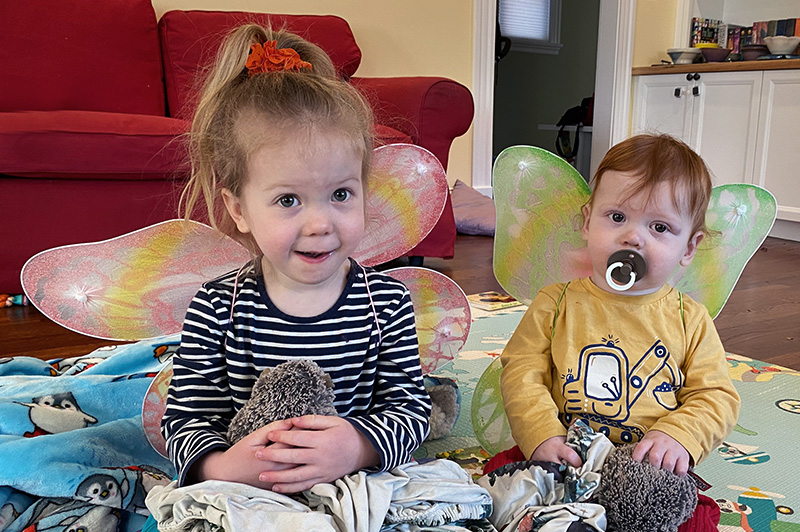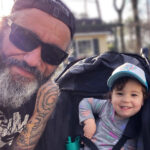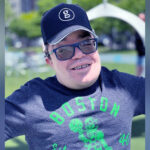Guided by her own experience, one mom navigates Stickler syndrome with her children

Aimee is more than just Mum to three-year-old Arwen and one-year-old Cedric; she’s their guide to navigating Stickler syndrome, a genetic connective tissue disorder that can cause an underdeveloped jaw and airway obstruction (collectively known as Robin sequence), as well as cleft palate, vision and hearing difficulties, and other findings. As a carrier herself, Aimee has firsthand experience with the effects of Stickler syndrome and has watched her own mother manage the condition. To Aimee, her journey has prepared her to help her children understand Stickler syndrome and appreciate the care they receive through Boston Children’s Hospital, which has included jaw surgery, cleft palate repair, and ear tubes for Arwen.
Managing expectations of Stickler syndrome care
Aimee and her family first came to Boston Children’s through the Maternal Fetal Care Center, in affiliation with Brigham and Women’s Hospital (MFCC), when her OB-GYN detected Arwen had an underdeveloped lower jaw (micrognathia) during her 12-week prenatal ultrasound and referred Aimee for further testing. A fetal MRI at the MFCC confirmed micrognathia and a cleft palate, so Aimee and her husband, Paul, worked with the MFCC team to determine the next best steps for care.
The MFCC team set up Aimee and Paul with the Cleft and Craniofacial Center, including Dr. Cory Resnick, who specializes in treating Robin sequence. Together, they discussed what to expect and what surgical interventions would be required. For Arwen, this would mean a jaw-advancement surgery almost immediately after delivery to resolve airway obstruction and support feeding and growth during the critical infancy period.
“Dr. Resnick was great about telling us the signposts they’d be looking for and letting us know that Arwen would need to be born somewhere with a high-level neonatal intensive care unit (NICU) in case she had trouble breathing or swallowing after delivery.”
As anticipated, Arwen struggled to breathe against an obstructed airway immediately after delivery and was unable to feed by mouth. She received a nasogastric (NG) tube to help keep her nourished while plans for an operation to correct the obstruction were made. Two weeks after Arwen arrived, she was transferred from the NICU in her birth hospital to Boston Children’s to undergo mandibular distraction with Dr. Resnick. In addition to her jaw surgery, at 10 months, Dr. Ingrid Ganske, a plastic surgeon with the Cleft and Craniofacial Center, repaired Arwen’s cleft palate at the same time that otolaryngologist Dr. Gi Soo Lee fit her with ear tubes. A few years later, Arwen had her tonsils and adenoids removed.
Doubly prepared for a second diagnosis
About a year later, when Aimee was pregnant with Cedric and an amniocentesis confirmed he too had Stickler syndrome, Aimee and Paul relished their connection to teams at Boston Children’s, as it helped them feel even more prepared to navigate his care.
Dr. Resnick closely monitored Cedric’s breathing and oral feeding just after his birth to determine if he would need the same early jaw operation as Arwen. However, because of the highly variable presentation of Stickler syndrome, Cedric was less severely affected and was able to breathe well enough to avoid the operation. Aimee anticipates Cedric will also one day need care for his cleft palate. He and Arwen are being monitored by Dr. Efren Gonzalez, an ophthalmologist and retina specialist, as Stickler syndrome causes a 30 to 40 percent lifetime risk of retinal detachment and severe vision loss.
Facing a boundary-less future
Watching Arwen go through multiple surgeries hasn’t been easy for Aimee and Paul, nor is knowing the future holds even more procedures for both their children. However, they’re confident in the care Arwen and Cedric receive at Boston Children’s, and Aimee draws on her own experience with Stickler syndrome to find a sense of peace about what lies ahead. “I’ve always viewed my own health as a blessing and that I should do as much as I can,” Aimee says. “So, even though Stickler comes with physically limiting effects, we kind of balance putting boundaries over what physical activity they can and can’t do without constraining them too much. I want them to feel as though there isn’t anything they can’t do.”
Learn more about the Cleft and Craniofacial Center and the Maternal Fetal Care Center at Boston Children’s Hospital.
Related Posts :
-

New year, new face, same spirit: Zoey’s journey with encephalocele and cleft lip care
Seven-year-old Zoey loves school, her friends, and everything unicorn. She’s outgoing and happy and has an eye for looking ...
-

Miles for Jack: Robin sequence and the bond between a family and doctor
For runners and non-runners alike, next week’s Boston Marathon is extra special. It marks a beloved tradition for the ...
-

How Robin sequence paved a dad’s road to the Boston Marathon: Chad and Izzy’s story
Go to any marathon starting line and you’re bound to find someone who was “never a runner” until something — ...
-

Decades in the making: JR’s journey with craniofacial care
Last fall, JR Foley posted on Facebook to thank members of the Craniofacial Program at Boston Children’s Hospital for ...





